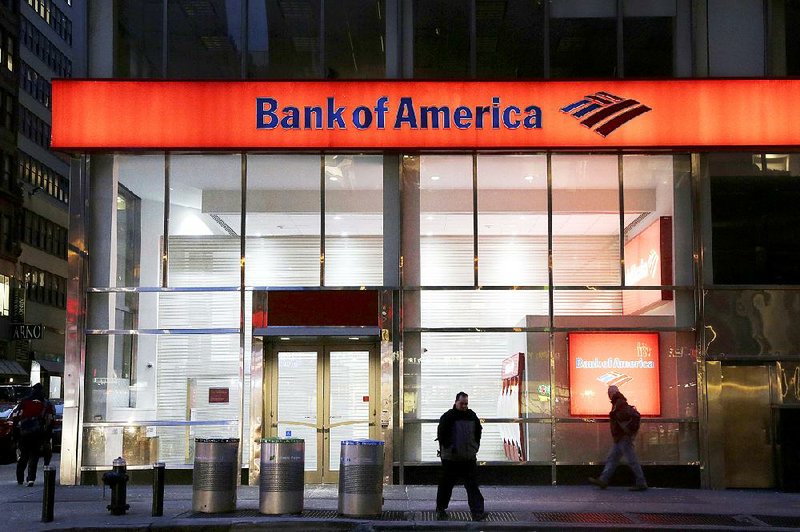WASHINGTON -- The Federal Reserve gave the green light Wednesday to major U.S. banks to raise dividends and buy back shares, deeming that they have a sturdy enough financial foundation to withstand a major economic downturn.
But the Fed gave Bank of America only conditional approval because of what were seen as weaknesses in its plans dealing with risks and possible losses.
The central bank also rejected plans by the U.S. divisions of two European banks, saying their planning for financial risks is inadequate. Those divisions belong to Germany's Deutsche Bank and Spain's Santander.
The Fed approvals announced Wednesday were the result of its "stress tests" -- an annual checkup of the nation's biggest financial institutions. This year, 31 banks were tested to determine if they have large enough capital buffers to keep lending through another financial crisis and severe economic downturn.
The remaining 28 banks can raise dividends or buy back shares. They included JPMorgan Chase & Co., Citigroup Inc., and Wells Fargo & Co., which with Bank of America are the four biggest U.S. banks by assets.
Wall Street powerhouses JPMorgan, Goldman Sachs and Morgan Stanley had to revise their capital plans to reduce their dividend payouts or share repurchases late last week after the initial results of the stress tests.
Shortly after the Fed announced its decisions Wednesday, a handful of banks announced they were increasing their dividends, including JPMorgan Chase and Wells Fargo. Bank of America, the second-largest U.S. bank, announced plans to buy back $4 billion in stock after the conditional approval from the Fed.
"We believe that this year's planned repurchase program is the best way to continue to drive value for our shareholders," Brian Moynihan, Bank of America's chief executive, said in a statement. "We are committed to meeting the requirements in the time frame the Fed has established."
Bank of America has until Sept. 30 to resubmit its capital plan. If the new plan for its financial management processes isn't acceptable to the Fed, the regulators said they may restrict dividend increases or share buybacks.
In stress tests in 2013, JPMorgan Chase & Co. and Goldman Sachs were required by the Fed to resubmit their capital plans.
The notable "pass" among the 31 banks was Citigroup. The bank did not pass last year, and Chief Executive Officer Michael Corbat was under tremendous shareholder pressure to make sure Citi got through. Industry analysts had said previously that if Citi did not pass this time, Corbat could have lost his job.
"Citi doing as well as it did is a big positive sign for the industry as a whole," said Nancy Bush, an industry analyst with NAB Research.
The dividends and share buybacks plans that the Fed considered are important to ordinary investors and to banks.
The banks know that their investors suffered big losses in the financial crisis, and they are eager to reward them. Some shareholders, especially retirees, rely on dividends for a portion of their income. For the banks, raising dividends can drive up their share prices and make their stock more valuable to investors.
But raising dividends is costly, and regulators don't want banks to deplete their capital reserves, making them vulnerable in another recession. Buybacks also are aimed at helping shareholders. By reducing the number of a company's outstanding shares, earnings per share can increase.
It was the second straight year that the Fed rejected the plans of Santander, which is one of the biggest banks in Europe. Deutsche Bank, Germany's biggest bank, was added to the testing roster for the first time this year. Santander and Deutsche Bank have extensive U.S. operations, with about $118 billion and $55 billion in assets, respectively.
Still, a Fed official noted that Santander's U.S. division represents less than 10 percent of its global operations. The affected part of Deutsche Bank's U.S. operations is small, only 12 percent to 14 percent of the U.S. division.
The Fed said Santander's U.S. operation showed "widespread and critical deficiencies" with regard to governance, planning for risk and other areas. The affected part of Deutsche Bank's operations showed "numerous and significant deficiencies" in identifying risks and projecting revenue and losses, the regulators said.
In a statement, T. Timothy Ryan Jr., a nonexecutive chairman at Santander, said, "We will continue to reinforce our governance and management to address our supervisor's qualitative concerns."
The announcement Wednesday followed last week's results of the Fed's annual "stress tests." The regulators determined that the U.S. banking industry is better able to withstand a major economic downturn than at any time since the financial crisis.
The Fed said all of the 31 biggest banks with operations in the U.S. are adequately fortified to withstand a severe U.S. and global recession and keep lending.
The big Wall Street banks, as well as hundreds of others, were bailed out by the government during the financial meltdown. The banking industry has been recovering steadily since then, with overall profits rising and banks starting to lend more freely. The banks have mostly repaid the taxpayer bailouts.
The Fed has conducted annual stress tests of the largest U.S. banks since 2009, the year after the crisis plunged the country into the worst economic downturn since the Great Depression of the 1930s.
Other banks tested were: American Express Co., Bank of New York Mellon Corp., BB&T Corp., BBVA Compass Bancshares Inc., BMO Financial Corp., Capital One Financial Corp., Comerica Inc., Discover Financial Services, Fifth Third Bancorp, Huntington Bancshares Inc., KeyCorp, M&T Bank Corp., Northern Trust Corp., PNC Financial Services Group Inc., Regions Financial Corp., State Street Corp., SunTrust Banks Inc., U.S. Bancorp and UnionBanCal Corp.
Information for this article was contributed by Ken Sweet of The Associated Press and by Peter Eavis of The New York Times.
Business on 03/12/2015
